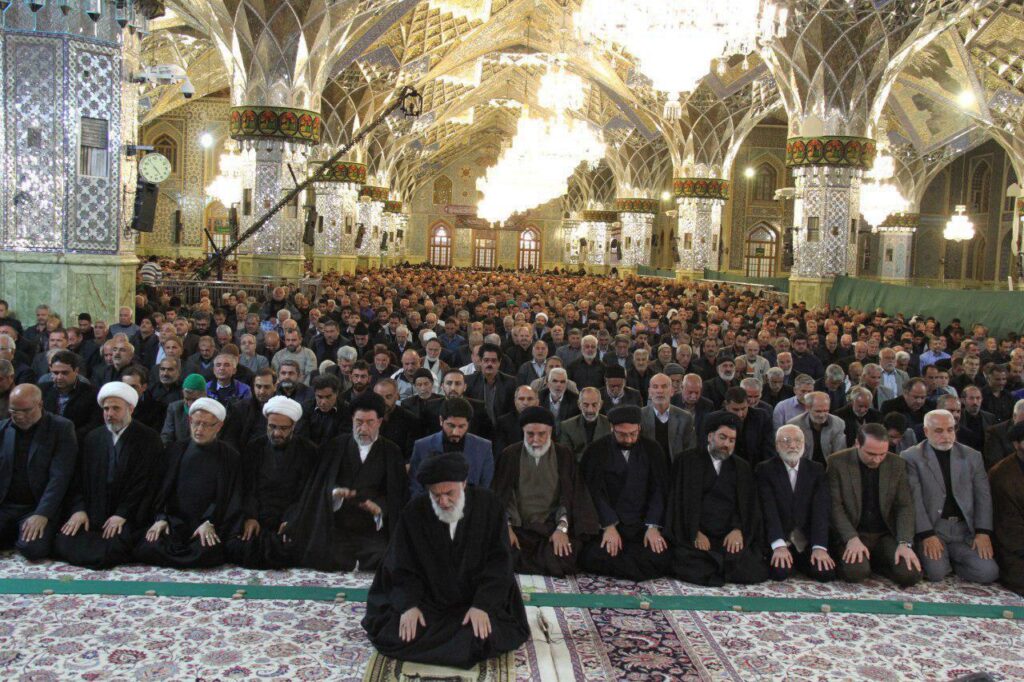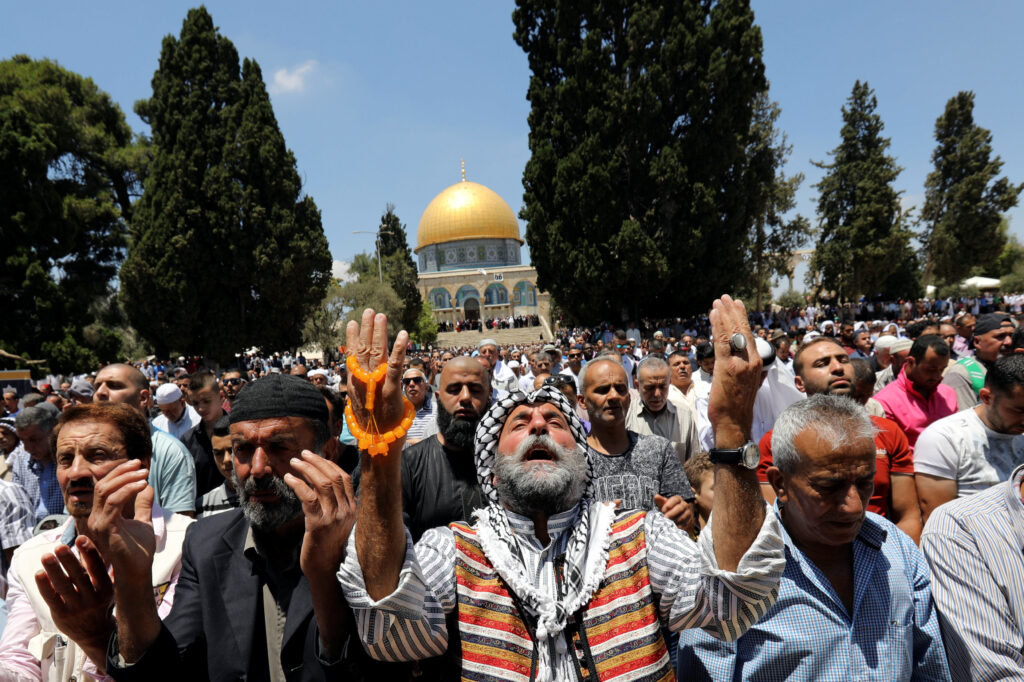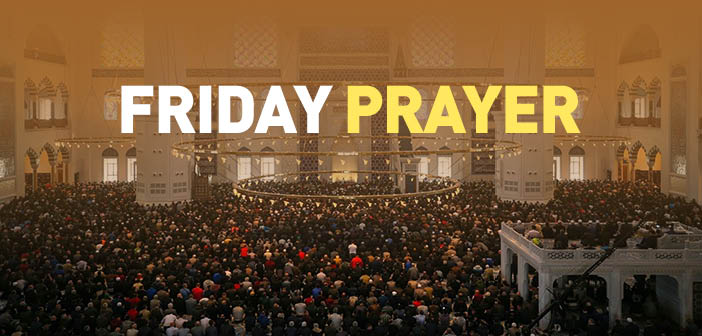How to Pray Friday Prayer: Rules and Virtues
Contents
- 1 How to Pray Friday Prayer: Rules and Virtues
- 1.1 Prerequisites for Friday Prayer
- 1.2 Starting Friday Prayer with Sermons
- 1.3 How to Pray Friday Prayer
- 1.4 Rules of Friday Prayer
- 1.5 Significance of Friday Prayer
- 1.6 Friday Prayer in the Quran
- 1.7 Occasion of Revelation of the Verses about Friday Prayer
- 1.8 Friday Prayer in Hadiths and Narrations
- 1.9 Benefits of Friday Prayer
- 1.10 Consequences of Missing Friday Prayer
- 1.11 Conclusion
- 1.12 Footnotes
How to Pray Friday Prayer: Rules and Virtues
Friday prayer is a two-rak’ah prayer that Muslims perform every Friday at noon instead of the midday prayer (Dhuhr). This prayer cannot be prayed individually and must be performed in congregation. For Friday prayer to be valid, at least five people must be present, one of whom is the Friday prayer leader (Imam) and the rest are followers (Mu’mineen). This article discusses how to pray Friday prayer, its rules, and its virtues.
Prerequisites for Friday Prayer
Like other prayers, performing ablution (Wudu) is obligatory for Friday prayer. Friday prayer is usually held in main mosques in cities and villages, but in larger cities, due to the large crowds, it may be held in prayer halls (Musalla) or open spaces. Before starting the prayer, the Friday prayer leader must deliver two sermons to the worshipers, which include an invitation to piety.
Starting Friday Prayer with Sermons
Friday prayer begins with the delivery of the first sermon by the Imam. Since the sermons are considered part of the Friday prayer, it is necessary for all worshipers to listen to both sermons in silence and tranquility. Delivering two sermons by the Imam or the speaker before the prayer is obligatory. After the sermons are finished, the Friday prayer begins.
As mentioned, Friday prayer is offered instead of the midday prayer, so the Friday prayer sermons are considered to be in place of the first two rak’ahs of Dhuhr, and the two-rak’ah Friday prayer takes the place of the last two rak’ahs of Dhuhr. Often, the speaker and the Imam are the same person, but sometimes the speaker is someone else.
When the speaker or Imam is delivering the sermons, it is obligatory for all worshipers to listen to the sermons, and talking during the sermons is disliked (makruh) because it may prevent them from listening properly. In this case, silence is required for the participants. It is also said that during the sermons, engaging in activities such as praying supererogatory prayers or reciting supplications, reading books, etc., as well as doing anything that disrupts listening to the sermons, is not appropriate.
In the first sermon, the Imam or speaker focuses on religious and worship recommendations, and in the second sermon, depending on the important events of the day, they explain and interpret domestic and foreign events from the perspective of Islam. The division and naming of Friday prayer sermons into religious and political sermons became common after the Islamic Revolution in Iran.
Note: If someone misses the first sermon or both sermons before Friday prayer, participating in Friday prayer is still virtuous and replaces the midday prayer.

How to Pray Friday Prayer
Friday prayer has two rak’ahs as follows:
- After making the intention and starting the prayer with Takbiratul-Ihram (saying “Allahu Akbar”), like in congregational prayer, the follower remains silent and the Imam recites Surah Al-Fatihah and another Surah from the Quran (it is recommended to recite Surah Al-Jumu’ah after Surah Al-Fatihah in the first rak’ah).
- Then Qunut is performed, and in Qunut, the follower recites the Qunut supplication along with the Imam.
- After Qunut, bowing (Ruku’) and two prostrations (Sujud) are performed with the Imam and other followers. The Dhikr (remembrance of Allah) of Ruku’ and Sujud are recited by the followers.
- After Sujud, stand up for the second rak’ah. The follower remains silent, and the Imam recites Surah Al-Fatihah and another Surah (it is recommended to recite Surah Al-Munafiqun after Surah Al-Fatihah in the second rak’ah).
- Then, along with the congregation, perform Ruku’. After rising from Ruku’, Qunut is performed. After Qunut, there is no more Ruku’, and proceed directly to Sujud, and the rest of the prayer is performed like the Fajr (dawn) prayer.
Rules of Friday Prayer
In addition to the conditions and rules of other prayers, Friday prayer also has specific rules that are important to consider:
- In Shia Islam, Friday prayer is obligatory with an option (Wajib Takhyiri), meaning that during the occultation of the Imam of the Time, it is not obligatory. Individuals have the option to either pray the obligatory Dhuhr prayer at noon on Friday or participate in Friday prayer. However, in Sunni Islam, Friday prayer is individually obligatory (Wajib Aini), and participation is mandatory.
- The validity of Friday prayer depends on praying it in congregation. The minimum number of people for Friday prayer is one Imam and four followers [1]. Most Shia scholars [2] consider the presence of at least five people to be necessary. Hanafis require at least three people in addition to the Imam, Shafi’is and Hanbalis require at least forty people, and Malikis consider the quorum to be twelve residents of the city [3].
- In Shia Islam, only one Friday prayer is held in a city. If it is held in another location as well, the later Friday prayer will be invalid [4]. The reason is that Friday prayer should be held with grandeur, and if it is held in several places in a city or village, it will create division and disunity among Muslims and undermine the foundations of unity [5].
- The distance between two Friday prayers in Shia Islam must be at least one Farsakh (approximately 6 kilometers), but in Sunni Islam, Friday prayer can be held in multiple locations within a city.
- Friday prayer has two Qunuts in two rak’ahs. The Qunuts of Friday prayer are recommended (Mustahab), like the Qunut in other prayers. One Qunut is performed in the first rak’ah before Ruku’, and the other Qunut is performed in the second rak’ah after Ruku’.
- All the rules and conditions that must be observed in congregational prayer are also valid in Friday prayer [6].
- Cleanliness of the body, performing Ghusl (ritual bath) for Friday, wearing clean clothes, using perfume, and brushing teeth are among the emphasized etiquettes of Friday prayer, which are also recommended in narrations.
Note: It is important to note that Friday prayer actually replaces the Dhuhr prayer on Friday, and after praying it, the Asr prayer, which has four rak’ahs, should be prayed.
Significance of Friday Prayer
Friday prayer is one of the most magnificent acts of worship in Islam because it is always performed in congregation. This prayer and the gathering of worshipers for it, along with the gathering of Muslims for Eid al-Fitr and Eid al-Adha prayers, and the massive gathering of Hajj, are among the four major Islamic gatherings [7]. At the same time, Friday prayer is one of the arenas for people’s presence and participation in the Islamic community, which is why it is considered one of the manifestations of the popular nature of the Islamic government [8].
Due to the integration of this prayer with the lofty goals of Islam, it is referred to as “political-worship prayer [9]. Friday prayer is known as an enlightening and informative prayer for every member of society, providing knowledge and awareness along with faith [10], and a true, direct, widespread, and influential media.
In addition to the worship aspect of Friday prayer, the role and importance of its political aspects are such that the Umayyad and Abbasid caliphs, by turning it into a political symbol and manifestation of their caliphate, gradually marginalized and weakened its worship role to advance their ruling goals [11].

Friday Prayer in the Quran
The importance of Friday prayer is evident from the fact that a Surah in the Quran is named after it (“Surah Al-Jumu’ah”) and focuses on the invitation to establish Friday prayer. In this Surah, believers are explicitly invited to leave their daily affairs and trade and attend Friday prayer. Verses 9 to 11 of Surah Al-Jumu’ah are about Friday prayer and its benefits:
یَا أَیُّهَا الَّذِینَ آمَنُوا إِذَا نُودِیَ لِلصَّلَاهِ مِنْ یَوْمِ الْجُمُعَهِ فَاسْعَوْا إِلَىٰ ذِکْرِ اللَّهِ وَذَرُوا الْبَیْعَ ۚ ذَٰلِکُمْ خَیْرٌ لَکُمْ إِنْ کُنْتُمْ تَعْلَمُونَ
“O you who have believed, when [the Adhan] is called for the prayer on the day of Jumu’ah [Friday], then proceed to the remembrance of Allah and leave trade. That is better for you, if you only knew!” [12]
62:09
فَإِذَا قُضِیَتِ الصَّلَاهُ فَانْتَشِرُوا فِی الْأَرْضِ وَابْتَغُوا مِنْ فَضْلِ اللَّهِ وَاذْکُرُوا اللَّهَ کَثِیرًا لَعَلَّکُمْ تُفْلِحُونَ
“And when the prayer has been concluded, disperse within the land and seek from the bounty of Allah, and remember Allah often that you may succeed.” [13]
62:10
وَإِذَا رَأَوْا تِجَارَهً أَوْ لَهْوًا انْفَضُّوا إِلَیْهَا وَتَرَکُوکَ قَائِمًا ۚ قُلْ مَا عِنْدَ اللَّهِ خَیْرٌ مِنَ اللَّهْوِ وَمِنَ التِّجَارَهِ ۚ وَاللَّهُ خَیْرُ الرَّازِقِینَ
“But when they saw a transaction or a diversion, [O Muhammad], they rushed to it and left you standing. Say, ‘What is with Allah is better than diversion and than a transaction, and Allah is the best of providers.'” [14]
62:11
Occasion of Revelation of the Verses about Friday Prayer
Regarding the occasion of the revelation of these verses, Jabir ibn Abdullah narrated:
A group had gathered with the Messenger of Allah (peace be upon him) for Friday prayer. At that time, the sound of the drums of a trade caravan carrying food and supplies was heard. All those present left for trade and the sound of the entertaining drums, except for eight or twelve people. The Messenger of Allah said, “If you had also gone, the punishment of Allah would have descended upon the Ummah (Muslim community).
Friday Prayer in Hadiths and Narrations
Numerous hadiths have been narrated from the Prophet Muhammad (peace be upon him) and the Imams (peace be upon them) about the importance and benefits of Friday
prayer, which indicate the importance of this political-worship obligation. Some of them are:
- Prophet Muhammad (peace be upon him) said: “Whoever hears the call to Friday prayer, Friday prayer becomes obligatory upon him.” [15]
- Imam Ali (peace be upon him) said: “I guarantee paradise for six people with Allah, one of them being the one who goes to Friday prayer and dies on the way, then paradise is for him.” [16]
- Imam Muhammad al-Baqir (peace be upon him) said: “Friday prayer is a tradition from the Prophet of Islam, a glad tiding for the believers and a rebuke for the hypocrites.” [17]
- Imam Ja’far al-Sadiq (peace be upon him) said: “When the Friday prayer leader finishes the sermons until the rows of Friday prayer are arranged, supplication is answered. Also, at the end of Friday until sunset, supplication is answered.” [18]
- Imam Muhammad al-Baqir (peace be upon him) said: “Three things cause elevation of ranks: complete ablution in cold weather, waiting for prayer after prayer, and going day and night towards congregational and Friday prayers.” [19]
- Imam Ali (peace be upon him) said: “Whoever leaves Friday prayer for three consecutive weeks without an excuse is considered one of the hypocrites.” [20]
- Prophet Muhammad (peace be upon him) said: “Friday is the day when Allah gathers everyone in it, so there is no believer who goes to Friday prayer on that day except that Allah makes the Day of Judgment easy for him and orders him to be taken to paradise.” [21]

Benefits of Friday Prayer
According to the narrations from the Infallibles (peace be upon them), Friday prayer has many benefits. As the Messenger of Allah said: “Whenever a believer moves towards Friday prayer, Allah reduces the anxieties of the Day of Judgment for him and guides him towards paradise.” [22] Naturally, a prayer with this level of recommendation and emphasis from religious leaders can have numerous effects in individual and social, moral, political, and other areas.
The benefits mentioned for this great and magnificent gathering include: growth and development of the social dimensions of Islam, strengthening unity and solidarity among the Muslim Ummah, increasing love and affection among Muslims, awareness of current issues in all social dimensions, addressing social, political, and economic problems and challenges, and the possibility of using collective wisdom to solve them, etc.
In addition to these social effects that Friday prayer has on the members and aspects of the Islamic society, it also has numerous effects on the individual personalities of the worshipers. As mentioned in the narrations and hadiths, forgiveness of sins, acceptance of supplications, the promise of paradise, etc., are among the individual benefits of Friday prayer.
Consequences of Missing Friday Prayer
Just as there are positive consequences for praying and persisting in Friday prayer, there are also negative consequences for abandoning it. Negative consequences such as sealing the heart [23], distress, removal of blessings from work, non-acceptance of prayer, Zakat, and Hajj, non-acceptance of good deeds, etc. [24]
Conclusion
In conclusion, we ask for the prayers of the angels and divine beings for those who establish Friday prayer. As the Messenger of Allah, Prophet Muhammad (peace be upon him) said:
“When I was taken to the heavens on the Night of Ascension, I saw seventy thousand cities under the Throne of Allah, each city like your world, and also angels who had spread their wings and were glorifying and praising Allah, saying: ‘O Lord! Forgive those who attend Friday prayer, O Allah, have mercy on those who perform Ghusl on Friday.'”
Prophet Muhammad
Footnotes
- Shaykh Tusi, Tahdhib al-Ahkam, 1404 AH, p. 103.
- Sayyid Murtada, Rasa’il al-Sharif al-Murtada, Qom, vol. 1, p. 222; Hilli, al-Sara’ir, Qom, vol. 1, p. 290; Fadil Hendi, Kashf al-Litham, Tehran, vol. 4, p. 215.
- Kasani, Bada’i’ al-Sana’i’ fi Tartib al-Shara’i’, 1409 AH, vol. 1, p. 266.
- Husayni ‘Amili, Miftah al-Kiramah, Qom, vol. 2, pp. 130-135; Najafi, Jawahir al-Kalam, 1981 AD, vol. 11, p. 245.
- “The Scope of Friday Prayer.” Hawzah website. Retrieved July 15, 2009.
- “Conditions of Friday Prayer.” Ayatollah Safi Golpaygani’s Information Database. Retrieved July 15, 2009.
- Vare’i, “The Movement to Revive Friday Prayer,” p. 5.
- Hashemi Rafsanjani, “Jurisprudential, Political, and Social Dimensions of Friday Prayer,” 54.
- Ibid., p. 55.
- Ayatollah Khamenei, Speech at the Ninth Gathering of Friday Prayer Leaders.
- Rudgar, “From Prayer to Symbol,” p. 4.
- Surah Al-Jumu’ah, verse 9, Makarem Shirazi translation.
- Ibid., verse 10.
- Ibid., verse 11.
- Kanz al-‘Ummal, vol. 7, p. 723.
- Wasa’il al-Shi’a, vol. 5, p. 11.
- Ibid., vol. 6, narration 7602.
- Wasa’il al-Shi’a, vol. 5, p. 45.
- Bihar al-Anwar, vol. 88, p. 10.
- Mustadrak al-Wasa’il, vol. 2, p. 6291.
- Man La Yahduruhu al-Faqih, vol. 1, p. 427.
- Wasa’il al-Shi’a, vol. 7, narration 9390.
- Kanz al-‘Ummal, hadith 21123.
- Wasa’il al-Shi’a, vol. 5, p. 7.

